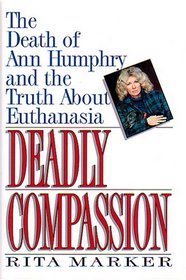Pam P. (Meowkatt) reviewed Deadly Compassion: The Death of Ann Humphry and the Truth About Euthanasia on + 67 more book reviews
When Ann Humphry, estranged wife of Derek Humphry (executive director of the Hemlock Society and author of the bestselling Final Exit), committed suicide in 1991, her farewell note asked Marker, an articulate and prominent spokesperson for antieuthanasia forces, to tell her story. This book is the result. The two women became friends in 1989, after Ann, who had lost both her husband and her job when she was stricken with breast cancer, called Marker for help. The breakup of the Humphry marriage was a messy one, involving public statements, lawsuits, and fighting within the Hemlock Society. Marker defends her friend loyally and tells Ann's side of the story convincingly. As cofounders of the Hemlock Society, the Humphrys were well-known leaders of the right-to-die crusade, but Ann's private feelings about euthanasia changed after her participation in her own parents' deaths. She came to see mercy killing not as a compassionate solution to suffering but as a ``deadly deception'' that leads only to more suffering. This view is shared by Marker, who uses Ann's story to trace the recent history of euthanasia and to argue forcefully against it. She fears that the right to die can easily become pressure to die, and she warns that giving physicians ``license to kill'' is a grave mistake. The statistics she cites on physician-induced deaths in the Netherlands--often regarded as a model by euthanasia advocates--are disturbing (e.g., that one thousand patients die each year from ``involuntary euthanasia,'' that is, without giving their consent to die). Marker advocates ``always to care, never to kill,'' Both a warm tribute to a lost friend and a cool argument by an experienced opponent of euthanasia--although it leaves many difficult questions unanswered.




